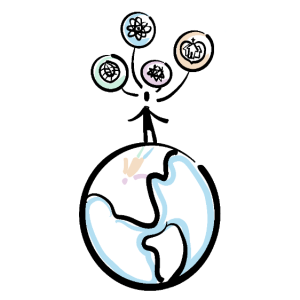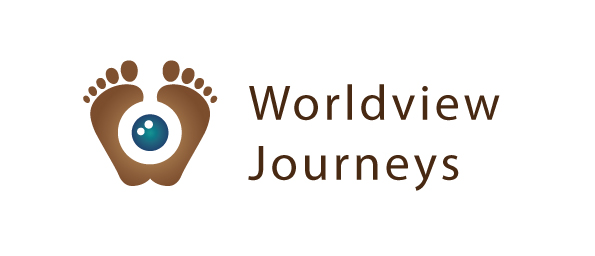The Worldview Journey is a transformative learning approach that invites learners to explore, exchange, and expand their worldviews
- Consists of short but deep learning journeys (of ± 4 – 6 hours each) that invite students to reflect on their worldviews (explore), communicate with those with other worldviews (exchange), and include nature and the planet into their worldviews (expand).
- Suitable for different higher education, adult education, and life-long-learning contexts.
- The program is fun, interactive, and deep, and has been received very well by students and online participants alike. (Read some testimonials below!)
- The program can be run online, on site, or in hybrid fashion.
- Facilitation is straightforward, and well supported by our online platform, high quality teaching materials, and a travel journal that guides students through the learning process.
- The first teacher training for using this program has been offered in the Spring of 2024. Here you can sign up to stay tuned on next year’s facilitator training.
- The program is based on extensive educational design research, reported in academic publications, including on the Seven-Step Learning Journey, the Stream-of-Consciousness Dialogue Practice (under review), and the overall design process (under review).

Developed in collaboration with Utrecht University
The Worldview Journey has been developed in collaboration with Utrecht University, with funding from Pathways to Sustainability. After several well-received pilots with students, extensive research, and continued cycles of testing and improving, the program is now made available to other educators in the form of our first teacher training.
Because the program supports participants’ exploration, reflection, and exchange (rather than just transmitting knowledge), it can be used in a variety of contexts and at different learning levels. It’s suitable for higher education, but can also be used in adult and life-long-learning contexts. With some adaptation, older students at the high school/secondary education level are also likely to benefit.
Why the Worldview Journey?
The Worldview Journey supports students to explore their worldviews, in interaction with each other, and in relation to the bigger whole. It empowers them to reflect on their perspectives, take the perspectives of others, and cultivate more planetary perspectives. This has great value from a psychological, cultural, and societal/systems point of view.
Psychologically, exploring our worldviews helps us ‘take perspective on our perspective’. Rather than seeing with our worldview, we learn to look at it. This helps us question engrained assumptions and become more in charge of the narratives that shape our lives.
Culturally, exploring worldviews helps us gain understanding of others’ thinking and discover common ground with those who think differently. This enhances communication, collaboration, problem solving, and the strength of communities more generally.
Societally, exploring worldviews helps us reflect on the paradigms and purposes that shape our social, economic, legal, and other systems. This helps us respond more creatively to the complex issues in our world and create changes that are systemic and transformative.
Transformative learning methods
We use a range of transformative learning methods that include journaling, experiential activities, stream-of-consicousness dialogues, as well as knowledge. In each learning journey, participants travel through seven steps, the research-based Seven Step Learning Journey:
- Excavate (journaling to explicate what you already know, think, and feel about the learning topic)
- Absorb (take in relevant knowledge related to the topic)
- Experience (engage in an activity that relates the learning to your personal life and experience)
- Observe (reflect on that activity to derive insight or learning from it)
- Deepen (engage in deep dialoge with a fellow traveler to explore the topic in an even more personal and intimate way)
- Exchange (share your insights and hear those of others, in the whole group)
- Consolidate (look back at your journaling notes from step 1 and reflect on what has changed in the journey you’ve made. Articulate your learning or change.)
Through taking these steps, we systematically create conducive conditions for deep, transformative learning, which often ‘peaks’ in step 5. Each step is important.
Also the role of more traditional knowledge transmission through video-lectures is not to be underestimated. Here you can view a list of the different questions/topics engaged with in each video-lecture..
Testimonials from students and online participants
I had a really educational and useful experience. I learned a lot and was supported to think about things I had never thought (this deeply) about.
It was a beautiful and interesting experience! I think it enhances mutual respect. It also enhanced my understanding that your worldview can keep evolving and that there are qualities in each worldview that are valuable.
It was different and refreshing!
I have gained more respect for the different worldviews. This had been very valuable.
I learned a lot of new things and my awareness of my own worldview really grew.
It was very positive and a new kind of experience for me.
I thought it was a really eye-opening experience! It was also interesting to discuss with people who had different worldviews than me.
I think it is really good to understand the importance of worldviews, because you can understand yourself, each other and society better.
Thought provoking. Sustainability is such a mammoth of a challenge, with no exact route. I always found that the hardest place to begin problem-solving is the start. But what better place to start then to look at the world from all points of view ~ from all worldviews.
It was a nice experience! I liked taking the test and learning about my worldview. And then discussing this with others to see how they think differently. I became more aware of the different worldviews and their qualities and limitations, as well as about my own. I liked understanding where my way of thinking comes from, and how it needs to evolve if I want to change my worldview.
It was powerful, I felt expanded, connected and more open to others, enriched…with greater hope, and possible practical applications for my area of interest… The process of exploring worldviews with a stranger was really interesting! … What a simple, easy, practical accelerator for positive understanding and change!
I found the dialoguing exercise very useful, as it made me realize that the more open and attentive I am with someone, the better I can understand them. I also think that verbally expressing my thoughts and experiences is helpful to get a better understanding of myself.
The videos were outstanding. They were very clear and informative. I watched them twice to make sure I did not miss anything. I also liked the Worldview Test. The journaling exercise was helpful, and allowed me to compare my notes to your description of worldviews.
It was extremely eye opening and created a stronger inner balance. It reminded me strongly to accept all kinds of worldviews and get rid of all arrogance, to accept all opinion and treat everyone with the same humble respect, whether I agree with them or not. I also learnt how the worldviews are relevant in the sustainability-context and how understanding that there are different worldviews could on one hand make solution-finding difficult at first, but that the art is to see the differences as inspirational inputs to find solutions.
The Worldview Journey revealed something quite profound to me, as it made me realize the evolution of worldviews in my own life. I was raised Presbyterian (traditional). In my teens, an existential crisis led me to a more practical, rational, independent view (modern). Through college and early career I discovered creative paths of self-expression and engaging with others (postmodern). Through my later career I developed interest in integrative health and wellness (integrative). This worldview serves me well as I retire and consider life through a more expansive spiritual perspective. Realizing my worldview evolution gave me a connection to each worldview.
The worldview journey was insightful, for it encouraged an acknowledgement of alternative perspectives that differ to my own, but also promoted a recognition of my personal worldview journey and growth. …. The mixture of direct learning and brainstorming constructed an engaging environment which elevated my knowledge development and attention. … The stream of consciousness exercise was a unique experience, for it contrasted the ambience and structure of typical interactions, and provided an opportunity for freedom of expression and thought. I enjoyed learning from someone with a different worldview, as it exposed how my perspective contrasts with others with respect to religion and development. The listening component was also beneficial, for it encouraged complete concentration and focus on the other person.
One insight that I’ve learned is that all worldviews are valid and there is not one “correct” worldview. It is important to have a nonjudgmental attitude towards each other and our worldviews and to hold space for the different perspectives. In order to solve issues like climate change, we have to find a common-ground where we have understanding for every worldview. …. I also realized how important it is to actually listen to someone. Sometimes understanding what someone else is talking about is a very useful tool to gain a different perspective and question your own thinking, to evaluate how your thought process came to be. Sometimes we are so immersed into our own “bubble” or world that just having a conversation with someone with a different worldview can really change your mindset.
I think I now better understand why people think what they think. For example, when someone disagreed with me on social injustice issues, I used to think “how could anyone think like that?”. But now, thanks to the worldviews, I can understand the foundation on which ideas were built, where they come from. It might make me be more understanding and willing to listen to other views, instead of just blindly thinking I am in the right.
It was very nice to just start talking without being judged or interrupted. This allowed a lot of space to sometimes actually pause and think, without the other person stepping in to keep the conversation flowing all the time. Next time when I’ll have a deep conversation I want to try to just listen sometimes without interrupting to give the other person space to think.
I liked the Worldview Journey. It is different than usual, when you only listen to a lecture and ask questions. Now you get the opportunity to discuss more. I also liked that you get the opportunity to think about your own worldview and reflect upon it, and that you hear about others’ worldviews.
It was intriguing and self actualising.
